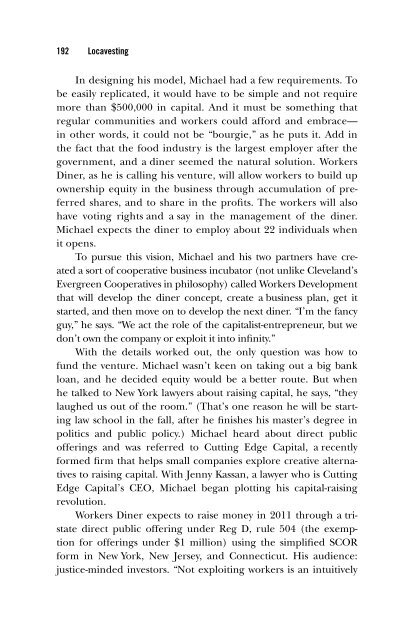3c hapter - Index of
3c hapter - Index of
3c hapter - Index of
Create successful ePaper yourself
Turn your PDF publications into a flip-book with our unique Google optimized e-Paper software.
192 Locavesting<br />
In designing his model, Michael had a few requirements. To<br />
be easily replicated, it would have to be simple and not require<br />
more than $500,000 in capital. And it must be something that<br />
regular communities and workers could afford and embrace—<br />
in other words, it could not be “bourgie,” as he puts it. Add in<br />
the fact that the food industry is the largest employer after the<br />
government, and a diner seemed the natural solution. Workers<br />
Diner, as he is calling his venture, will allow workers to build up<br />
ownership equity in the business through accumulation <strong>of</strong> preferred<br />
shares, and to share in the pr<strong>of</strong>i ts. The workers will also<br />
have voting rights and a say in the management <strong>of</strong> the diner.<br />
Michael expects the diner to employ about 22 individuals when<br />
it opens.<br />
To pursue this vision, Michael and his two partners have created<br />
a sort <strong>of</strong> cooperative business incubator (not unlike Cleveland’s<br />
Evergreen Cooperatives in philosophy) called Workers Development<br />
that will develop the diner concept, create a business plan, get it<br />
started, and then move on to develop the next diner. “I’m the fancy<br />
guy,” he says. “We act the role <strong>of</strong> the capitalist- entrepreneur, but we<br />
don’t own the company or exploit it into infi nity.”<br />
With the details worked out, the only question was how to<br />
fund the venture. Michael wasn’t keen on taking out a big bank<br />
loan, and he decided equity would be a better route. But when<br />
he talked to New York lawyers about raising capital, he says, “they<br />
laughed us out <strong>of</strong> the room.” (That’s one reason he will be starting<br />
law school in the fall, after he fi nishes his master’s degree in<br />
politics and public policy.) Michael heard about direct public<br />
<strong>of</strong>ferings and was referred to Cutting Edge Capital, a recently<br />
formed fi rm that helps small companies explore creative alternatives<br />
to raising capital. With Jenny Kassan, a lawyer who is Cutting<br />
Edge Capital’s CEO, Michael began plotting his capital- raising<br />
revolution.<br />
Workers Diner expects to raise money in 2011 through a tristate<br />
direct public <strong>of</strong>fering under Reg D, rule 504 (the exemption<br />
for <strong>of</strong>ferings under $1 million) using the simplifi ed SCOR<br />
form in New York, New Jersey, and Connecticut. His audience:<br />
justice-minded investors. “Not exploiting workers is an intuitively
















